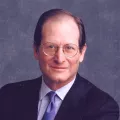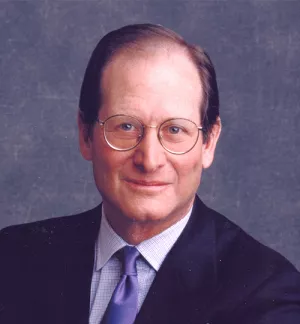The season of lists is now upon us: best book, best film, best album ... of 2010.
But, I was recently tempted by another, older list: the Modern Library's best novels in English since 1900 (first published in 1998 and judged by the likes of Daniel Boorstin, A.S. Byatt, Vartan Gregorian, and William Styron ).
Ranked number one is James Joyce's Ulysses, written from 1914 to 21, published in 1922 and a source of controversy every since (for example, banned as obscene in the U.S. until 1933).
My last reading of the novel was in 1962 as an 18-year-old college freshman in one of the best courses I have ever had-a "close reading" introductory humanities class that in the spring semester focused on just four books (Paradise Lost, Huckleberry Finn, Portrait of the Artist as a Young Man, and Ulysses). We spent more than a month on Ulysses itself. I first found it dense, perplexing, and often incomprehensible, but after reading and re-reading, after studying interpretations by others, I came to love it (and understand some of it).
Yet as the years passed, and the inevitable dinner conversations occurred about the five best novels we had read, Ulysses was never mentioned by anyone (except the stray English major). And when I would ask about it, most would answer: "have started it several times, but never got very far. Too hard."
So, inspired by the "best novels since 1900 list", with affection dimmed by time and having forgotten almost everything I may have once known about the novel, I decided to try again almost 50 years later (!!!!).
What I found was two novels: a deeply humanistic one which brilliantly and beautifully captures the life of a day in Dublin primarily through three main characters; and a second, highly literary one of surpassing complexity and, without careful study, limited accessibility.
The deeply humanistic novel gives us remarkable insight into Stephen Dedalus (a young writer who aspires to literary greatness, is haunted by the death of his mother, rejects the superficiality of journalism and is teetering on the edge of alcoholism and dissipation); into Leopold Bloom (an advertising salesman, lapsed Jew, lover of food and drink, son of a suicide, father of a dead son and a ripening teenage daughter and wanderer who traverses Dublin during the day and night, befriends Stephen, and returns to his marital bed which, as he knows well, was the scene of an afternoon affair between one Blazes Boylan and his wife); and into Bloom's wife Molly (a singer and earthy mother/wife who fears aging, is jealous of her younger daughter, longs for a sexual relationship with Bloom, relishes her afternoon affair, talks frankly about her bodily functions, speaks in vivid contradictions about love, children, life, aging and women, and at the end remembers romantically the time when she and Bloom first made love).
Unlike many 19th century novels, this humanistic one does not end in either marriage or death, but in ambiguity about what will happen in the future to Stephen, Bloom and Molly and to their relationships. But this uncertainty grows out of a vivid recreation of the multiple sights, sounds, smells and voices of Dublin on June day in 1904. Bloom's pork kidney breakfast frying in a pan. The sound of the trolley cars. The vomit in the bedside bowl of Stephen's dying mother. Tugs moving across the horizon on the "snotgreen sea." The funeral of an old drunkard. The birth of a child. The arguments in a pub. Bloom masturbating on the beach as he watches a young woman show off her knickers. Stephen and Bloom in the nightmare of Nighttown. Stephen and Bloom at Bloom's home watching the wandering stars and peeing below Molly's window. Molly relieved that her menstruation shows she is not pregnant by Boylan.
Joyce set out to create life in all its fullness without heroic scenes or gestures or declamations but through a fully realized expression of a city and its people on one typical day-and through ironic puncturing of human pomposity and pretense. Despite its reputation as a difficult read, many of the chapters or important passages in Ulysses are accessible to a regular reader who is not a candidate for a PhD. For example: the opening chapter where Stephen is mocked by his friend and critic "stately plump Buck Mulligan; the passages in the pub where Bloom engages in verbal warfare with the anti-Semitic "citizen;" the distant seduction of Bloom on the beach by Gerty McDowell who reveals herself as she leans back to watch the fireworks shoot into the sky and thenreveals that she is lame as she limps away; and even the last two chapters, one in the form of a catechism revealing the relationship between Stephen and Bloom and the second the famous stream-of-consciousness thoughts of Molly as she lies next to Bloom in the early hours of the morning.
Yet, the second Ulysses, the highly literary one, is still complex and inaccessible to a one-time generalist reader. Like many great works of literature, it requires repeated reading and deep study fully to understand-and ultimately to enjoy-the many dimensions and layers. The most obvious complexity, of course, is the analogy to Homer'sOdyssey (Latinized from Greek as Ulysses). The novel is loosely structured to mimic Homer's epic. And the main characters in Joyce's novel have referents in the Odyssey, although with profound differences: Bloom as a non-heroic Ulysses, Stephen as Ulysses' son Telemachus, but son without a strong attachment to his own father; and the faithless Molly as the faithful Penelope. Understanding the ways in which Ulysses is an ironic commentary on the Odyssey, and the ways in which Bloom, Stephen and Molly are, and are not, like Ulysses, Telemachus, and Penelope is a huge enterprise unto itself, upon which books have, of course, been written.
Joyce's novel is also stuffed with allusions and parodies and riddles, many of which require substantial knowledge outside the book. As Joyce himself said, he had "put in so many enigmas and puzzles that it will keep professors busy for centuries arguing over what I mean" which would earn the novel "immortality." One whole chapter on child labor and child birth is written in many different styles of English to show the birth of the language. The novel in various places and various ways addresses complex themes like the relationship between Christians and Jews, the aspirations, failures and pedantry of Irish Nationalism and the Irish Literary Revival, the interconnection between love and betrayal. And the style of the novel is, in fact, many different styles: in abandoning the omniscient narrator, the novel is often read as the true beginning of modernist literature.
So, Joyce's Ulysses is still a very hard read. How hard may be seen by contrasting it with the second "best" novel on the Modern Library list: The Great Gatsby. This novel is surely on everyone's list of top five favorite novels: it is short (one-quarter the length of Ulysses); it is accessible; it has an engaging narrator; it tells a powerful story from start to finish; it is written in beautiful, lyrical and penetrating prose; and, although it has many complex sub-texts, it sounds a single powerful theme-the failure of a materialistic American dream. Gatsby, too, bears reading and rereading to uncover the layers of complexity, but a first reading-or a reading after long absence-is a powerful, moving narrative experience in a way far different than Ulysses.
Still, I urge that people read the first Ulysses I rediscovered, the deeply humanisticnovel which is bursting with the enormous variety of life. I do have to say that my re-introduction to the novel was aided by 24 recorded lectures-simply entitled "Joyce's Ulysses"-delivered by James A.W. Heffernan, emeritus professor of English at Dartmouth (andavailable from The Teaching Company). Heffernan focuses primarily on the character and psychology of Stephen, Bloom and Molly but the lectures provide a guide through the chapters of the book and relate them to the Homeric myth and put them in context of other recurrent themes (e.g. Irish Nationalism). Perhaps that reading of the "first" Ulysses will provide a stimulus to explore the almost infinite dimensions of the second, literary one.
Both Gatsby and Ulysses have famous endings.
Gatsby:Gatsby believed in the green light, the orgiastic future that year by year recedes before us. It eluded us then, but that's no matter-tomorrow we will run faster, stretch out our arms farther...And one fine morning- So we beat on, boats against the current, borne back ceaselessly into the past.
Ulysses:...and how he kissed me under the Moorish wall and I thought well as well him as another and then I asked him with my eyes to ask again yes and then he asked me would I yes to say yes my mountain flower and first I put my arms around him yes and drew him down to me so he could feel my breasts all perfume yes and his heart was going like mad and yes I said yes I will Yes.
Both endings are not without deep ironies. But, the final sentences of Gatsby are about the futility of our dreams. The end of Ulysses is about the affirmation of our humanity.
Heineman, Ben. “Rereading 'Ulysses' by James Joyce: The Best Novel Since 1900.” The Atlantic, November 29, 2010


